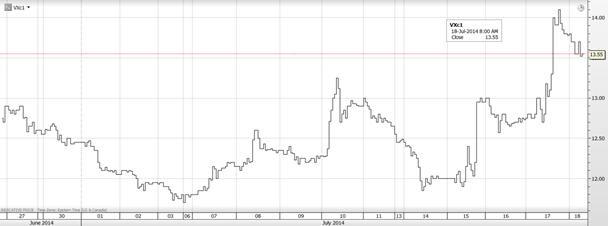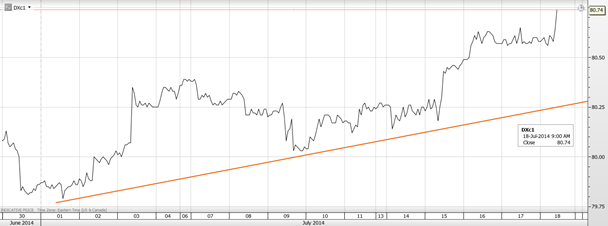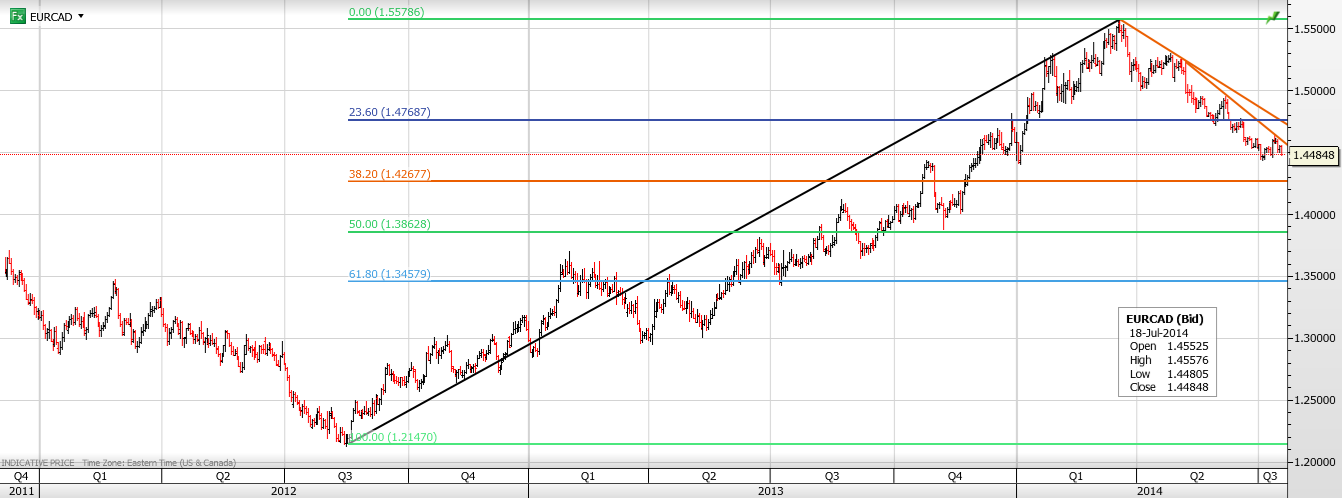It was a fairly subdued end to the week in Asia and Europe, with traders digesting the fall-out from the destruction of the Malaysian airliner over Ukraine and Israel's assault on Gaza. It was a different situation in Toronto for USDCAD traders, with inflation data sparking a flurry of activity. The release of higher-than-expected June CPI data (Actual 2.4 percent vs. Forecast 2.3 percent, year-over-year) led to a quick but short-lived rally for the loonie. The reaction was silly and surprising considering the Bank of Canada's take on domestic inflation. It is not a stretch to assume that the BoC had a good gauge of this data on Wednesday when it released the Monetary Policy Report (MPR). The governor, Stephen Poloz, was clearly unimpressed with the recent increases in CPI so today's data will have zero effect on his pessimistic outlook for the Canadian dollar.
The week that was
US Federal Reserve chairman Janet Yellen, Stephen Poloz and Vladimir Putin were this week's puppet masters as they orchestrated a lively dance by the FX marionettes.
Monday was all about waiting for Tuesday and Yellen's Humphrey-Hawkins speech. FX traders really wanted to hear something hawkish in her remarks and many of them did. EURUSD dropped back to levels not seen since European Central Bank president Mario Draghi announced negative deposit rates for the Eurozone. Tuesday also brought the release of the minutes from the Reserve Bank of Australia's policy meeting. They failed to provide fresh insight and the governor's complaint of a "strong AUD" fell on deaf ears. In the UK, higher-than expected inflation data drove GBPUSD to 2014 highs.
On Wednesday, Poloz delivered the quarterly MPR and put the loonie to flight. He emphasised the weakness of the Canadian economy, dismissed inflation gains and lowered forecasts for growth. USDCAD traders appear to have anticipated the pessimistic tone to the MPR, which served to limit the big dollar's gains.
Risk aversion sentiment was slowly seeping into FX markets on Thursday following the news that the Israel/Hamas conflict had escalated. Israeli Defense Force (IDF) ground troops crossed into Gaza backed by tanks, artillery and fighter jets in response to Hamas missile attacks. Then around 14:00 GMT, came the news that a Malaysian airliner went missing over Ukraine and was believed to have been shot down. That was the straw that stirred the risk aversion drink but overall, FX markets appeared unperturbed.
The week that will be
It looks like another slow start to the week in FX land with very little in the way of economic data, and Japan closed for "Marine Day". That will give traders time to fret about the state of the world and the accusations and recriminations bandied about over the loss of the Malaysian jetliner as well as keeping risk-off trades near the forefront.
Tuesday brings a big data for US data in the form of CPI and housing. So far, US CPI has been tame and not a factor for traders. However, there has been some evidence that inflation will give rate hike hawks some ammunition. Another increase in Existing Home Sales is likely to fuel the economic recovery story.
On Wednesday, the Bank of England (BoE) minutes will be released. The GBPUSD rally could get a new life if it reveals hints that UK rates are rising earlier than anticipated, especially after the BoE governor Mark Carney's recent contradictory interest rate comments.
Thursday begins with the Reserve Bank of New Zealand (RBNZ) interest rate decision and policy statement. Previously, a July rate hike was considered almost a "given" but soft inflation data and weak dairy prices have added considerable risk to that sentiment, which is reflected in the 0, 0100 point drop in NZDUSD this week. Thursday is also chock-full of PMI data from China, Eurozone and the US and UK Retail Sales data.
Friday closes the week with German IFO data, UK GDP and US Durable goods data. Soft IFO data will keep the downward pressure on EURUSD as would a strong Durable Goods number. This session will also be understated due to the Federal Reserve Open Market Committee (FOMC) meeting and US payrolls data the following week, which will give traders an excuse to get an early start to another summer weekend.
VIX fears geopolitics – FX markets fear Fed
The Chicago Board of Trade Volatility Index (VIX) is a forward-looking measure of equity market risk. It is also known as the "Fear Index". The geopolitical events over the past two days have knocked it out of its slumber, leading to a big jump. The US dollar index (DX) jump was more subdued mostly in response to what traders believed was a "hawkish" sounding Janet Yellen. That changed today when the DX jumped, suggesting that FX traders are leery of an elevation of hostilities in Ukraine over the weekend.


EURCAD sales could slow loonie's fall.
The wave of bearish sentiment following the BoC's MPR report has put downward pressure on the Canadian dollar. The short-term USDCAD technicals turned bullish with the break of 1.0690 last Friday and this week's move above 1.0740 suggests that a short-term base is in place. The short-term USDCAD outlook expects gains above 1.0820 to extend towards 1.1050. However, the expected USDCAD momentum faded rather quickly after spiking to 1.0790 and today's drop to 1.0710 suggests USDCAD gains will be hard-won. Part of the reason is due to EURCAD. That cross is trading just above strong support in the 1.4430-70 area. If the support is broken, heavy EURCAD selling will offset USDCAD demand.

